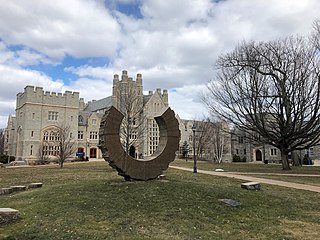
The University of Connecticut School of Law is the law school associated with the University of Connecticut and located in Hartford,Connecticut. It is the only public law school in Connecticut and one of only four in New England. As of 2020,it enrolled 488 students.

Quinnipiac University School of Law is the law school of Quinnipiac University located in North Haven,Connecticut. It is a member of the Association of American Law Schools,and is currently ranked tied at 143rd by U.S. News &World Report.

The Connecticut Supreme Court,formerly known as the Connecticut Supreme Court of Errors,is the highest court in the U.S. state of Connecticut. It consists of a Chief Justice and six Associate Justices. The seven justices sit in Hartford,across the street from the Connecticut State Capitol. The court generally holds eight sessions of two to three weeks per year,with one session each September through November and January through May. Justices are appointed by the governor and then approved by the Connecticut General Assembly.

John Mercer Walker Jr. is a senior United States circuit judge of the United States Court of Appeals for the Second Circuit. He served as chief judge from September 30,2000,to September 30,2006,when he assumed senior status. He was a United States district judge of the United States District Court for the Southern District of New York,appointed in 1985 by President Ronald Reagan before being elevated to the Second Circuit in 1989.

Thomas Joseph Meskill Jr. was a United States circuit judge of the United States Court of Appeals for the Second Circuit. He previously served as the 82nd governor of Connecticut,as a United States representative from Connecticut,and as the mayor of New Britain,Connecticut. He is noted as having served in all three branches of government and at the local,state and federal levels of government during his career of public service.

The Connecticut Appellate Court is the court of first appeals for all cases arising from the Connecticut Superior Courts. Its creation in 1983 required Connecticut's voters and legislature to amend the state's constitution. The court heard its first cases on October 4,1983. The Appellate Court was also a partial successor to the former Appellate Session of the Superior Court,a court established to hear appeals in minor matters

Joette Katz is an American attorney who is a partner at the law firm,Shipman &Goodwin LLP. She was an associate justice of the Connecticut Supreme Court,where she also served as the administrative judge for the state appellate system,and later was the Commissioner of the Connecticut Department of Children and Families. In various roles during her career she has had an impact on issues of state and national importance,such as:criminal law,capital punishment,civil rights and the right to education,eminent domain,same-sex marriage,LGBTQ rights,sexual assault,sex trafficking,and helping children in state care move from institutions to families.
Ellen Ash Peters was an American lawyer and judge. She was appointed to the Connecticut Supreme Court in 1978. She was the first woman appointed to that court.
Christine Siegrist Vertefeuille is a Senior Justice of the Connecticut Supreme Court.
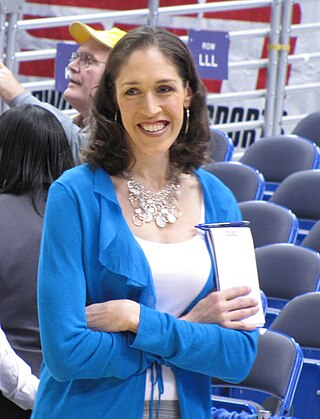
Huskies of Honor is a recognition program sponsored by the University of Connecticut (UConn). Similar to a hall of fame,it honors the most significant figures in the history of the UConn Huskies—the university's athletic teams—especially the men's and women's basketball teams. The inaugural honorees,inducted in two separate ceremonies during the 2006–07 season,included thirteen men's basketball players,ten women's basketball players,and four head coaches,of whom two coaches—Jim Calhoun and Geno Auriemma—and three players—Ray Allen,Swin Cash and Rebecca Lobo—are also enshrined in the Naismith Memorial Basketball Hall of Fame. Since that time,an additional twelve women's basketball players,ten men's basketball players,nine national championship teams,one women's basketball assistant coach,and one athletic director have been honored.
Allyn Larrabee Brown was a lawyer,judge,and chief justice of the Connecticut Supreme Court.
Joseph Walter Bogdanski was an American college football player,lawyer,and judge. He served as an associate justice of the Connecticut Supreme Court from 1972 to 1981,and as chief justice for several months in 1981,and played football at Colgate,earning an All-American selection in 1934.
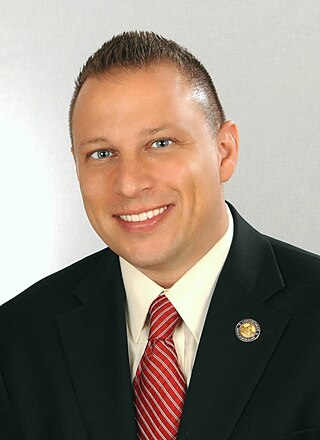
Robert Charles Sampson is an American politician from Connecticut. A member of the Republican Party,he was first elected in 2010 to the Connecticut House of Representatives from the 80th House district,serving four terms (2011–2018). Since 2019,he has been a member of the Connecticut State Senate,elected from the 16th Senate District.
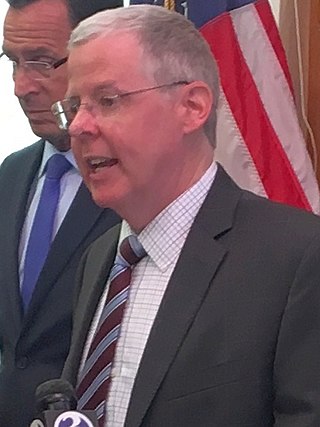
Gregory Thomas D'Auria is an American lawyer and judge who has served as an associate justice of the Connecticut Supreme Court since 2017. He previously was Solicitor General of Connecticut.
William H. Bright Jr. is the chief judge of the Connecticut Appellate Court.
Thomas Drummond Ritter is an American lawyer,lobbyist,and retired politician from Connecticut who was the Speaker of the Connecticut House of Representatives from 1993-1998.
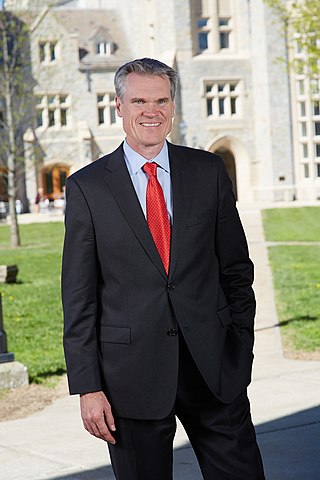
Timothy Fisher is dean and professor of law emeritus at the University of Connecticut School of Law.











